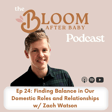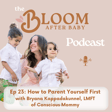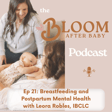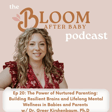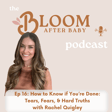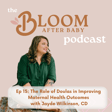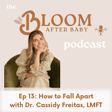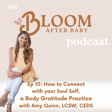
14. The Emotional Weight of the Invisible Load, with Jen and Rachel
This week, Rachel and Jen chat about our deeply meaningful episode with Dr. Cassidy Freitas, LMFT.
We continue to discuss how standard maternal health care is not truly informing women about what the all-encompassing transformation to motherhood can look and feel like in a way that empowers them to prepare and anticipate their needs, and make informed decisions about their health.
Plus, Rachel shares what it was like recently to step out of her "mom" shoes and getaway for a weekend with her college besties! Something she deliberated over and felt very uncomfortable about, but ended up being the best decision ever. It's okay to tap into the "old" parts of you when you become a mom!
After you listen, please be sure to rate and leave a review - this is the best way for us to learn what you want to hear more (or less) of, and keep getting this info out there!
Dr. Cassidy is leading the discussion around maternal mental health, the need for more education and integration of mental health services in routine maternal care, and working to change the narrative around the process of becoming a mother on the social and cultural level in her private psychotherapy practice.
Links and resources mentioned in the episode:
Mindful Momming 10-Day Challenge
A Guide to Hormones and Mood Changes in the Pregnancy & Postpartum
The Birth of a Mother (The New York Times by Dr. Alexandra Sacks, MD)
Free Guide to Addressing Resentment in Your Relationship After Baby
Dr. Jen's Practices for Connecting with Future You
You can learn more about Rachel's California-based group therapy practice and how you can work with her at www.racheldaggettlmft.com or on instagram @rachelscouch
Also, find us on Instagram @bloomafterbaby! If you rate and review the show, take a screenshot and tag us on instagram so we can share your review in our stories!!
Learn more about us and access all of our courses, services, and free resources at bloomafterbaby.com
Stay Tuned for more to come from Rachel Daggett and Dr Jen Jordan on all things motherhood and mental health - real mom experiences and insights from a licensed psychotherapist and medical doctor.
*Please note that this podcast is intended for educational purposes only, and is not a substitute for seeking individualized care from a mental health or medical professional*
Podcasts for expecting and new moms, best podcast for pregnancy postpartum, maternal mental health, motherhood, fatherhood, parenthood




